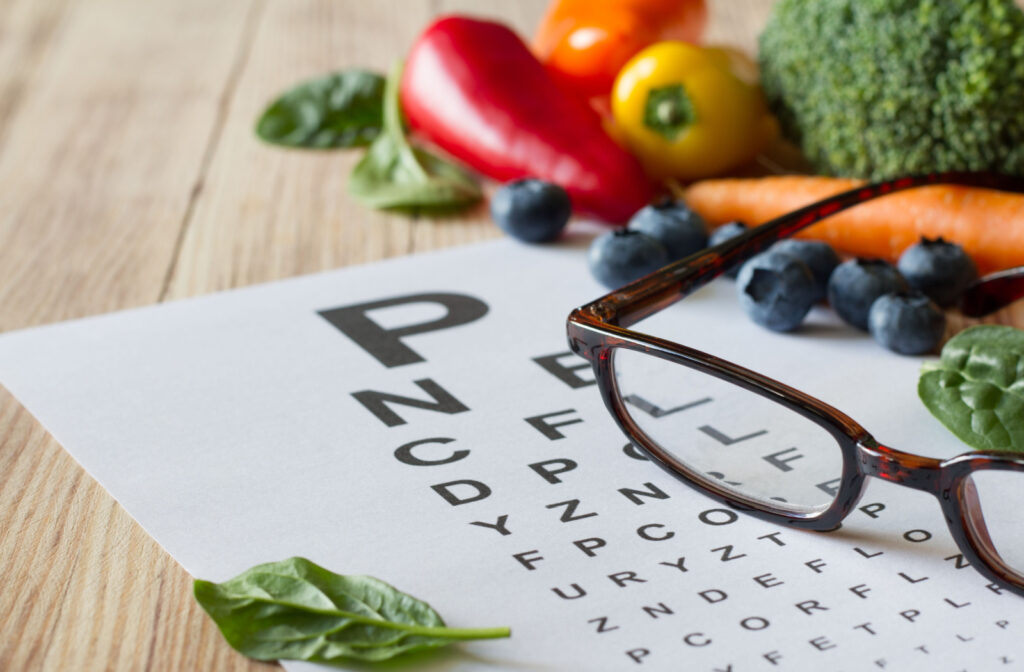Many people wonder what vitamins to take for vision and eyesight. There are many foods that promote eye health, which we will discuss, but not everyone is willing or able to include these foods in their regular daily diet. We carry a number of vitamin supplements and eye care products that are a great way to get the nutrients that your eyes need without having to completely realign your dietary habits.
Whether you opt to get these vitamins the natural way, through your meals and snacks, or take the easier route of buying vitamin supplements, here is what you should look for in order to maintain healthy eyes and crystal clear vision.
Vitamin A & Beta-Carotene
Carrots are rich in Vitamin A Beta-Carotene, which is one of the primary nutrients for optimal eye health. This crunchy orange veggie has a high level of Vitamin C as well. Both of these vitamins have been shown in studies to reduce eye pressure, which can help lessen the risk of glaucoma. Beta-carotene is also associated with a lower risk of developing macular degeneration.
Carrots aren’t the only foods that offer eye protection, however. There are many other foods that can be just as beneficial to developing healthy eyes and keeping them in great shape throughout your life. As with any other food-related goal, balance and moderation are the keys.
Vitamin C
Since Vitamin C is a powerful nutrient for good eye health, many people turn to the most obvious sources of it: citrus fruits. Oranges, tangerines, and grapefruit provide an abundant supply of Vitamin C. Yellow vegetables like squash and yellow bell peppers are also rich in it, as are softer-tasting foods such as sweet potatoes and pumpkins. Why take a vitamin supplement when all these rich natural sources of Vitamin C are available?
Vitamin E & Lutein
Leafy green vegetables like spinach or kale contain Lutein as well as Vitamin E. Many studies have shown that these two nutrients can help delay the development of eye cataracts. They also perform the same duty that sunscreen does for the skin, protecting the eyes from UV rays. Turnip greens, romaine lettuce, and broccoli are other good sources of these two nutrients.
But there’s more to life than vegetables. Add some nuts to your diet to increase your intake of Vitamin E. Hazelnuts and almonds are loaded with this vitamin. A small handful a day can reduce the risk of many eye problems, will promote a healthier heart, too.
The eyes also benefit from garlic. Not only does it help to lower blood pressure and cholesterol levels, but it can help prevent cataract development and promote proper lens focusing. That’s because it contains sulphur and quercetin. One clove of garlic per day can provide a lot of protection for the eyes.
Eggs are another excellent source of Lutein and Vitamin A. In fact, eggs provide the best source of Lutein and Zeaxanthin. Studies show that when one eats one egg per day scrambled, poached, boiled, or fried can reduce a person’s risk of developing macular degeneration to almost nothing. Those same nutrients also help minimize the risk of cataracts.
Omega-3 Fatty Acids
A fish that is particularly good for the eyes is salmon. These cold-water fish are known to provide omega-3 fatty acids that protect the heart, but they also provide Vitamin A, folic acid and other great nutrients that are good for the eyes, as well.
Zinc
Zinc is very important when it comes to healthy eyes. Zinc is an amazing mineral for eye health, but one should be careful when considering red meat as a source of zinc. Too much red meat can increase the possibility of early development of age-related macular degeneration. This disease is the leading cause of vision loss in people who are 50 years old or older. So, while red meat has its place in the diet, many studies have shown that intake should be limited to four times a week or less.
Other Antioxidants for Vision

There are many other antioxidants for vision which are great for keeping our eyes healthy. Herbs and spices, for example, not only jazz up the taste of foods, but they can bring benefits to every part of the body. The bilberry herb contains antioxidants that promote improved blood flow through capillaries in the eyes and allow the eyes to adjust to changes in light. Cinnamon is a popular spice that is also rich in antioxidants. Many others spices contain antioxidants ginger, thyme, rosemary, to name just a few. Include them when cooking to increase both flavor and eye protection.
Biotin
Look for biotin in organ meats, oatmeal, egg yolks, soy, mushrooms, bananas, peanuts, and brewer’s yeast. This contains unusual minerals that help in healthier eye development.
Choline
Choline is found mainly in soybeans, oatmeal, liver, cabbage, and cauliflower. Small amounts may be present in most multivitamin supplements and B-complex.
Choline is necessary for cell membranes, normal brain function and helps to facilitate the movement of fats in and out of our cells. Large consumption of choline may result in smelling like a fish, so only a small amount is needed!
Lycopene
Tomatoes are good for the eyes, too. Not only do they contain the super Vitamin C, but also Lycopene. The Lycopene levels increase once the tomatoes have been cooked and turned into ketchup or tomato sauce. An antioxidant, Lycopene helps reduce the levels of free radicals in the blood. This benefits the body in many ways, and the eyes are included.
A Proper Diet & Vitamin Supplements for Healthy Eyes
There are a lot of eye health needs that can be met through proper diet. Balance and moderation make the difference when it comes to any nutritional plan for health, including eye health. Eat a variety of the foods presented here, or compliment your diet with the appropriate vitamin supplements, and your eyes should grow and stay healthy. Consume foods rich in vitamins A and C, like carrots and citrus fruits, to promote eye health with long-term benefits. Vitamin E, when combined with the nutrient Lutein, can help reduce the risk of developing cataracts as a senior.
Keeping your body stocked up on these vitamins and minerals will help pass your next eye exam and vision screening with flying colors! Remember that you’ll find many of these nutrients in foods such as broccoli and eggs, and zinc can be accessed in beef, pork, and lamb. It’s an excellent idea to stock up on antioxidant-rich foods, from leafy vegetables to colorful fruits. Of course, if these foods have trouble finding their way into your diet, vitamin and mineral supplements are a great way to make up some of those essential nutrients that you’re missing out on. By giving your body the natural ingredients it craves, you’ll be preparing yourself for healthier eye care in the future.


